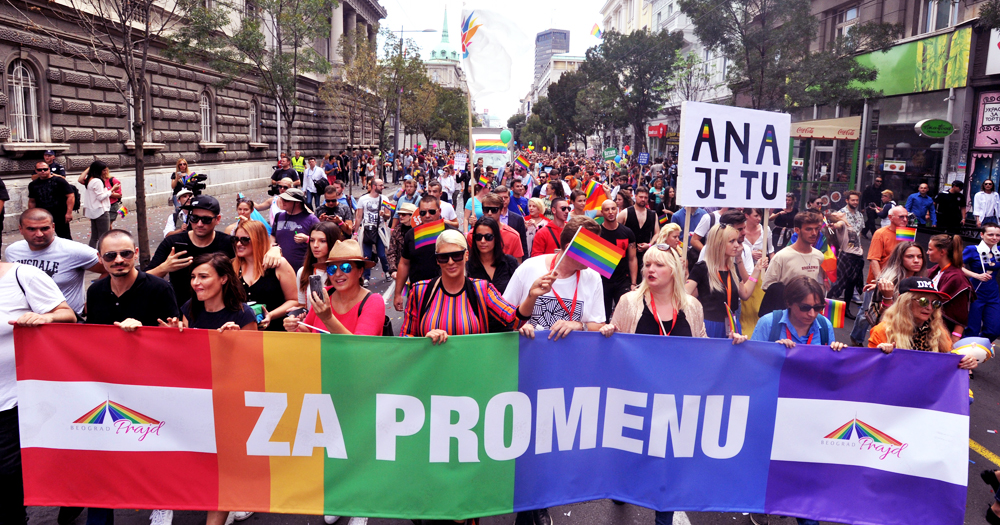On August 27, the President of Serbia Aleksandar Vučić announced that he was cancelling the pan-European LGBTQ+ EuroPride that was supposed to take place in Belgrade next month. During his speech, he cited threats from right-wing extremists and fear of clashes at the event as reasons to cancel.
Launched 20 years ago, EuroPride is the biggest Pride celebration in Europe and has been hosted in different cities throughout the continent. In 2019, members of the EuroPride Organisers Association chose Belgrade, the capital of Serbia, as the city that would host the event in 2022, in hope that the decision would represent a breakthrough for the country that is traditionally conservative and strongly influenced by the Orthodox Church.
In a conference in which he also proposed to extend the term of Ana Brnabić, Serbia’s first openly lesbian Prime Minister, President Vučić announced his decision to cancel EuroPride. “The Pride parade that was scheduled for the month of September will be postponed or cancelled, or whatever that miracle is called, it doesn’t matter,” he said.
To justify his decision, he cited the recent political crisis with neighbouring country Kosovo, which declared independence in 2008, economic problems that Serbia is facing due to Russia’s war in Ukraine and also threats from anti-LGBTQ+ and far-right extremist groups. “This is a violation of minority rights, but at this moment, the state is pressured by numerous problems,” Vučić added.
Indeed, on Sunday evening, a protest took place in the capital where thousands of right-wing protesters and church supporters marched against EuroPride, claiming they were trying to “save Serbia”, even though the event had already been cancelled. The protest was led by the Serbian branch of the Night Wolves, an organisation that is believed to have close ties with Russian President Vladimir Putin.
Prime Minister Brnabić, who was first elected in 2017 and has on numerous occasions been criticised by Serbian LGBTQ+ groups for doing very little to further the rights of queer people in the country, supported Vučić’s decision to cancel EuroPride. “No matter how you turn it, from any angle you look at it, the first inviolable thing is to ensure peace and stability in the country,” Brnabić said.
The majority of the LGBTQ+ groups that were involved in the organisation said that they are going to ignore Vučić’s announcement and that EuroPride is still happening in Serbia. “President Vucic cannot cancel someone else’s event. EuroPride is not cancelled, and will not be cancelled. During the bidding process for EuroPride 2022, Prime Minister of Serbia, Ana Brnabic promised the full support of the Serbian government for EuroPride in Belgrade, and we expect that promise to be honoured,” said President of the European Pride Organisers Association Kristine Garina.
“The ban of Europride is a huge step back, not just in queer emancipation, but the overall democratic transformation of Serbia,” commented Miloš Kovačević from Da se zna!, an LGBTQ+ organisation operating in Belgrade. “After eight years of practising freely our right of assembly, we are again in the situation to discuss whether we have the right to request anything at all instead of actually discussing our requests. You cannot escape feeling that as a queer person you are a second-order citizen in this country.”
https://twitter.com/Tikapic3/status/1563953047650402304?s=20&t=Lb2ba_M_nIUAVmJfaaCaSA
Indeed, this is not the first time in the history of Pride in Serbia that such events have been cancelled due to threats from far-right and extremist groups. The very first Pride parade that took place in Belgrade in 2001 was dubbed the “Massacre Pride” because hundreds of far-right extremists attacked the participants and the police failed to protect them. A similar outcome happened in 2010, despite the parade taking place amid heavy police security. Even with local authorities, Belgrade was turned into the picture of a warzone, with firebombs launched at the participants and buildings being burned.
What happened in 2010 was used as an excuse to cancel Pride for the next three years. More recent Pride marches always had to be held under heavy police surveillance to ensure that the LGBTQ+ community was protected from extremists.
“EuroPride in Belgrade will not be cancelled and will bring together thousands of LGBTI+ people from across Europe with LGBTI+ people from Serbia and the wider western Balkans,” said Garina.
© 2022 GCN (Gay Community News). All rights reserved.
Support GCN
GCN is a free, vital resource for Ireland’s LGBTQ+ community since 1988.
GCN is a trading name of National LGBT Federation CLG, a registered charity - Charity Number: 20034580.
GCN relies on the generous support of the community and allies to sustain the crucial work that we do. Producing GCN is costly, and, in an industry which has been hugely impacted by rising costs, we need your support to help sustain and grow this vital resource.
Supporting GCN for as little as €1.99 per month will help us continue our work as Ireland’s free, independent LGBTQ+ media.

comments. Please sign in to comment.